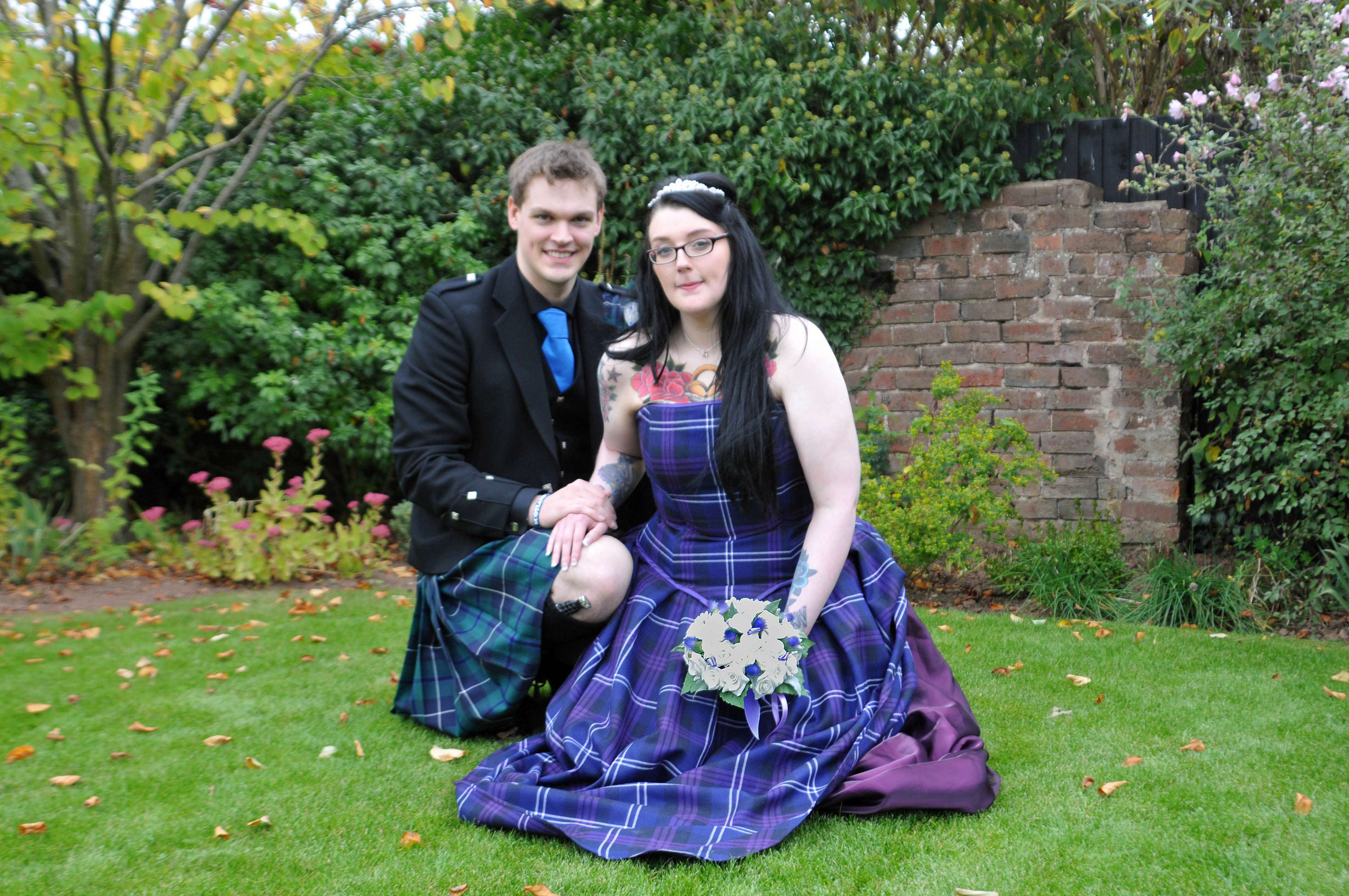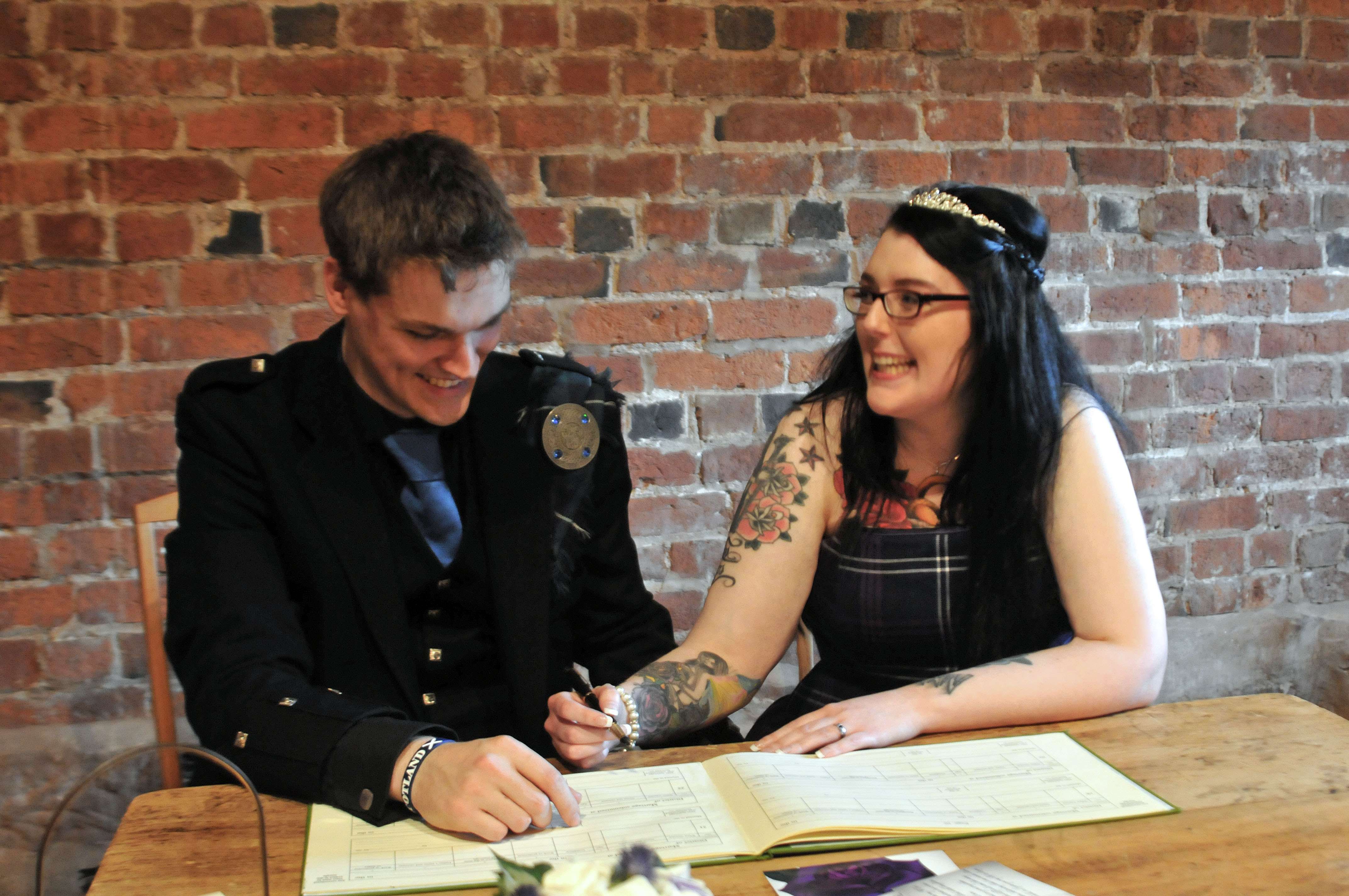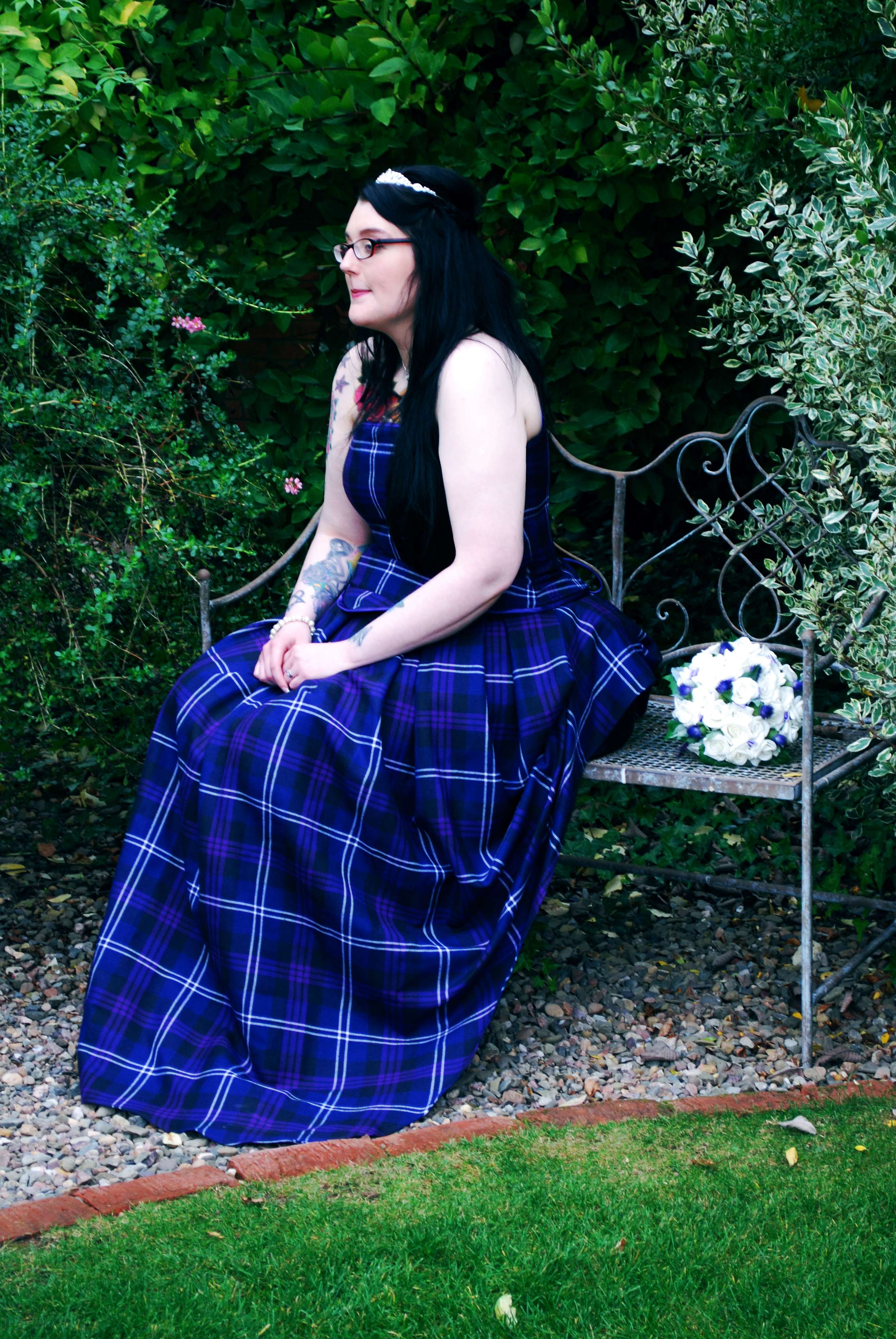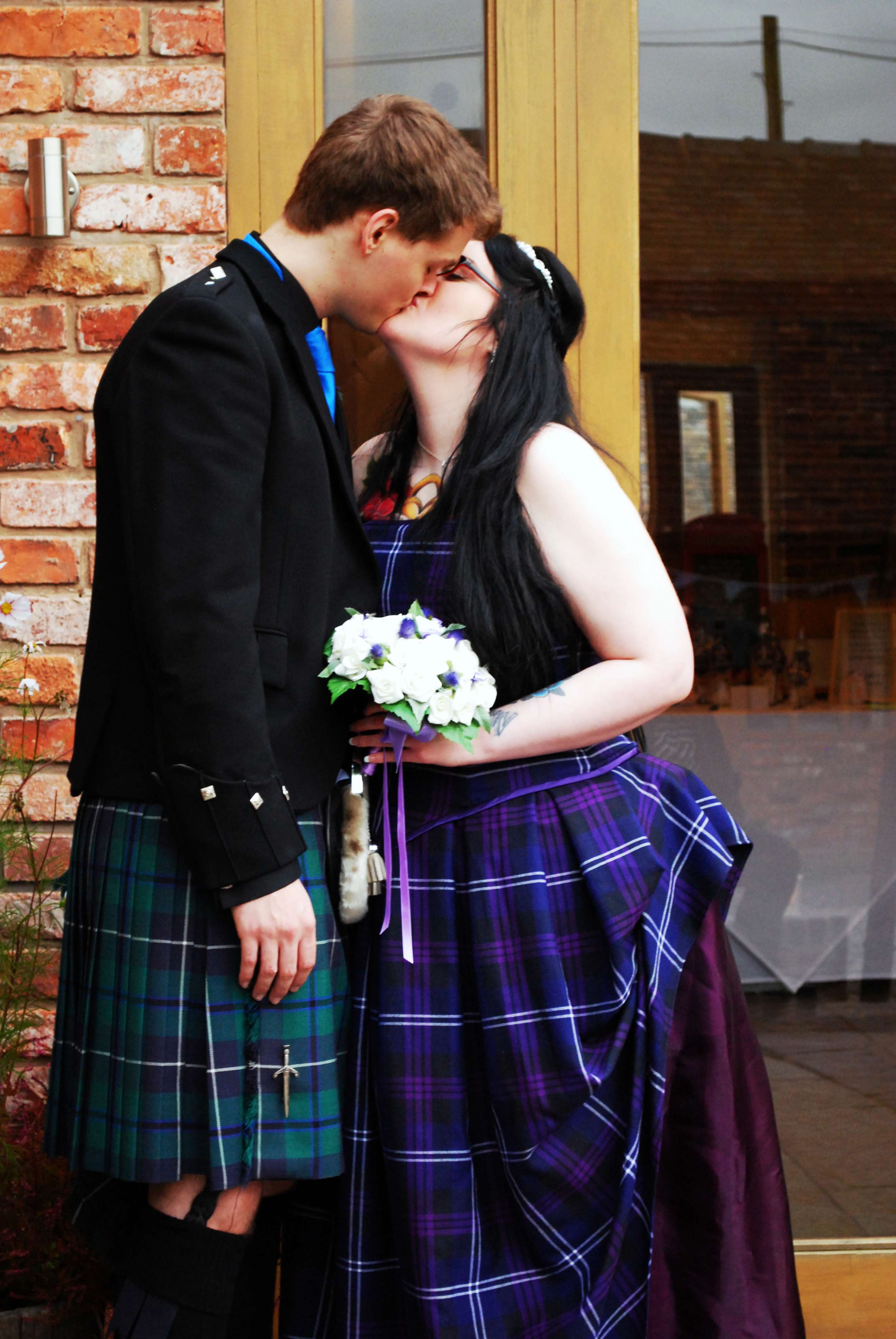
Rochelle, who has a number of chronic illnesses and is an ambassador for M.E Support UK, married Dan in 2014. Today she talks to us about what she learnt during her wedding planning, and shares some valuable tips for those of you in currently doing the same.
I’ve been married for eight years this year and if I could do it all over again I would; unfortunately, not because it was so enjoyable, quite the opposite in fact. There was so much going on in our lives at the time, that I ended up bombarded and smothered by things that in the end, just didn’t matter.
I was diagnosed with a multitude of chronic illnesses in 2013. I have M.E, Fibromyalgia, Endometriosis, Hyper-mobility, Costochondritis and Asthma. I had Asthma before meeting my fiancé but the rest all came hurtling at us in one giant, F-off curve ball at full speed just six months after we got engaged.
I got so absorbed in what I thought were huge issues at the time – for example, the weight I gained from not being as mobile anymore. It made me feel embarrassed and I was not feeling confident enough to go and try dresses on, so I settled and I really regret diminishing myself and our day.
I did most of the planning by myself, sitting up in bed, or with my now husband, who, added twist to our story, is neurodivergent. He was very involved in the planning but this was a requirement for him as he was never going to be able to be one of the “Tell me where and when and I’ll be there” partners. His anxiety levels didn’t allow it, he needed clear, concise information for all aspects which meant a lot more organisation required on my part.
Chronic illness takes so much away from those affected by it every day so I want to share some advice I learned in hindsight from my own experience to make sure you have the memorable celebration of your love that you deserve.

Make it Your Day
Seems obvious right? Your celebration should one hundred percent be about you and the person you love. However, once other people start to get involved it’s easy to start questioning your vision and decisions. As a chronically ill person, you need to think about your own health and make that a priority at every step. It’s not selfish, it’s survival.
Don’t listen to what others deem a ‘proper’ wedding (In fact if someone suggests your wedding isn’t a proper wedding then I would definitely strike them from the invite list!) and instead, make it the day you and your partner want and need it to be. Others will try and muzzle in and give their opinions all the time but at the end of the day, it’s your experience and you will regret not doing it your way.
Ask for Help
I let my complex of being a ‘burden’ stop me from doing a lot of things in my wedding experience. It ended up that I did most of the planning and organising by myself and on the day of our wedding my husband was ferrying people back and forth to the venue and almost missed our ceremony! It is not something I recommend at all for stress levels or your moral, I have no fun or meaningful memories of planning my day.
Be a Team
It’s ironic that the day of love and commitment you are planning for you and your partner can actually be one of the most argument-inducing subjects and times in your relationship. For anyone who is chronically ill, stress can be a huge trigger for flare. As my husband is neurodivergent, he isn’t always the best at communicating, especially when there is pressure or in a time sensitive situation.
We used an approach, that we actually still to use to this day, for any stressors or conflicts during planning. We planned a time in the day where we could begin discussions calmly and without distractions.

I had written up a discussion plan that was followed, detailing how the conversation would go:
 Identifying the issue – Express how the issue is making you feel and how you would like to remedy the issue. Both having 2-5 minutes to explain your view to each other. Time for questions to gain understanding of each view and validating each other.
Identifying the issue – Express how the issue is making you feel and how you would like to remedy the issue. Both having 2-5 minutes to explain your view to each other. Time for questions to gain understanding of each view and validating each other.
 Check in – Making sure you are both feeling you got what you needed out of the conversation and are both clear of how the situation has been solved or what decision has been made.
Check in – Making sure you are both feeling you got what you needed out of the conversation and are both clear of how the situation has been solved or what decision has been made.
We also have added cue cards, so if you are dealing with neurodiversity or have a partner that is, it means there are cards to reduce pressure and to give a clear sign of trying to process or communicate.
These can be on the lines of:
 Processing Card – I hear you are upset and want to take time to make sure I answer correctly.
Processing Card – I hear you are upset and want to take time to make sure I answer correctly.
 Time Out Card – I am feeling overwhelmed with information. This is important but I need a break.
Time Out Card – I am feeling overwhelmed with information. This is important but I need a break.
 Confusion Card – I’m finding this difficult to process or understand and need extra support.
Confusion Card – I’m finding this difficult to process or understand and need extra support.
It makes things a lot less volatile and keeps harmony while planning but it continues to build on the foundation for your marriage.

Don’t Settle
Now, I’m not for one minute suggesting that being a ‘Bridezilla’ is the way to tackle this but for your own sanity and health you need to be assertive and make sure you delegate. There will be situations where your needs will have to be catered to and you mustn’t feel ashamed or self-conscious about that.
Make sure your venue is aware of your situation and that they are happy to tailor to your circumstances. We viewed and met with staff at our wedding venue a few times, even once to take pictures for my husband to look over so he could have a visual for all the ideas etc. It’s important you can work with the team at your venue but if you feel they can’t provide what you need, talk to them about it. If it’s still not sitting well after the discussion, then, it’s essential you look elsewhere.
Don’t be scared to tell bridal stores that you’re chronically ill and ask for any adaptions you need. Ask for a longer time slot so you’re not rushing to get changed or most importantly, not feeling pressured to decide. There’s no harm in asking for a chair in the room so you can rest between changes etc either. The right place will be more than happy to help you.
Thwart Tradition
Attending a wedding as a guest can be really long, never mind when it’s your day. It’s all absolutely overwhelming and totally exhausting.
Instead, how about having a split celebration? Having the ceremony one day and then maybe you and your partner going to a lovely overnight stay or long weekend together and a week or so later having a big celebration?
Another idea is cutting down your actual day, which is what we opted for. You can have an early evening ceremony so you can more effectively plan your time on the morning of your day and it gives you the time to pace yourself for the most important parts. This is a really good options too if you, or your partner, are neurodivergent as it allows ‘check in’ times to make sure they aren’t getting too overwhelmed.

Timing is Everything
With my illnesses and my husband’s neurodivergence, I felt the best plan of action was to send out invites earlier than most people would. I got a lot of comments about this and a lot of people couldn’t understand why I wanted an answer by end of February when my wedding was September.
Being that organised saved me a lot of extra stress. Don’t listen to the “It’s awfully early” or “That’s a bit eager, isn’t it?” comments. Make sure your schedule accounts for your unpredictable health at all stages.
If you are booked in to go dress shopping for instance, make sure you give yourself a day of absolute rest before and after. There is a lot to be done in wedding planning but don’t make multiple appointments in one day, especially if there is a lot of travel involved to get to each vendor or place.
When viewing venues, make a list and try the closest ones first so you’re not using too much energy in simply getting there for the viewing and on the day. Flares happen but if you manage your time well, you can still keep on track without too much of a setback.
Enjoy Every Moment
It’s an exciting and stressful time, your emotions will be all over the place, especially the closer it gets to the day but it is imperative that you don’t stretch yourself beyond your limits. I ended up so exhausted on my day that I was so ill by the end of the night and into the honeymoon.
I have many regrets about our day; however, I have a memory of being on a balcony inside our venue that was attached to a private space for me and my husband due to our needs, that we both retreated to once the evening was in full swing. The memory is just him and I, no one else in the area, dancing to a song that meant so much to us both and it is that moment I recall when I start to think of my wedding day now.
Make sure you stop and really soak up everything on the journey; nothing is trivial, it is all part of your wedding experience. Take time out on your big day; alone and with just your partner to make sure you can process everything because it is these moments that will truly stay with you in the years to come.
About Rochelle Hanslow
Rochelle Hanslow is a chronic illness and mental health writer and self published children’s author dealing with life issues and mental health for kids. Rochelle is also ambassador for ME Support UK and sole contributor to their blog. To read more of her work or view her bookshelf you can visit madeyouco.com.
Powered by WPeMatico




